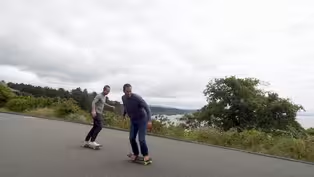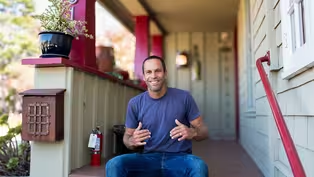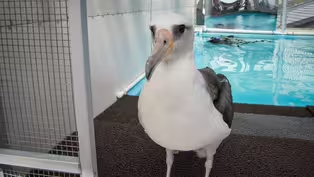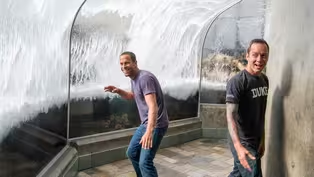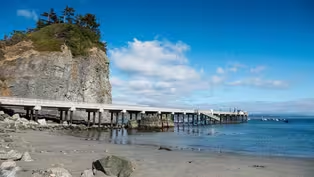
California Smoked Fish
Season 3 Episode 2 | 25m 31sVideo has Closed Captions
Jack Johnson reveals the influence his father had on him and shares those memories.
North Shore’s Jack Johnson, singer-songwriter, surfer and ocean activist, reveals the influence his father had on him and shares those memories on a road trip along the California coast. Enjoy the music, smoked fish and tales about early surfer migration to Hawaii.
Problems playing video? | Closed Captioning Feedback
Problems playing video? | Closed Captioning Feedback

California Smoked Fish
Season 3 Episode 2 | 25m 31sVideo has Closed Captions
North Shore’s Jack Johnson, singer-songwriter, surfer and ocean activist, reveals the influence his father had on him and shares those memories on a road trip along the California coast. Enjoy the music, smoked fish and tales about early surfer migration to Hawaii.
Problems playing video? | Closed Captioning Feedback
How to Watch Family Ingredients
Family Ingredients is available to stream on pbs.org and the free PBS App, available on iPhone, Apple TV, Android TV, Android smartphones, Amazon Fire TV, Amazon Fire Tablet, Roku, Samsung Smart TV, and Vizio.
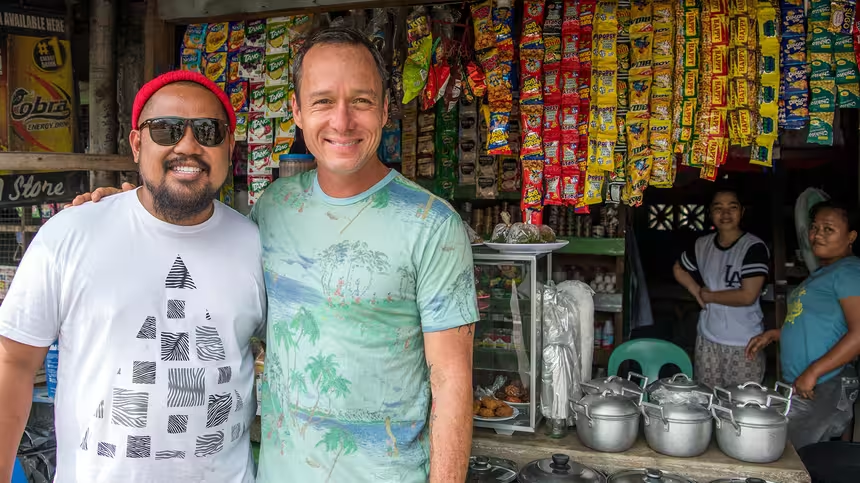
Get Recipes and More
Learn about host and chef Ed Kenney, explore recipes from the show and more.Providing Support for PBS.org
Learn Moreabout PBS online sponsorship-Here she is.
I should have warned you.
They do mate for life.
-Oh, there she goes.
-Oh, she picked me.
[ Beak clicking ] [ Laughter ] -Jack Johnson's music reflects his home of Hawai'i, but a life-changing road trip up the California coast traces his soul to something much deeper.
♪♪ ♪♪ -Every dish has a story.
Food brings people together and has the power to conjure up cherished memories.
-♪ There's no combination of words ♪ I could put on the back of a postcard ♪ -So happy to be here.
Hungry.
-Hungry.
Right.
[ Laughter ] -I was born and raised in the Hawaiian Islands, one of the most diverse communities in the world.
♪♪ -♪ I'll tell you one thing ♪ ♪ We're better together ♪ -In this show, we'll meet a guest from Hawai'i, learn about their favorite dish, and have some fun along the way.
-♪ So much better when we're together ♪ ♪♪ -On O'ahu, the district of Waialua contains some of the island's most famous places -- Mount Ka'ala, O'ahu's tallest peak, Kukaniloko, the birthplace of our Ali'i, and Waimea Bay on the North Shore, home to some of the biggest waves in the world.
I am what is affectionately known as a townie to the people on the North Shore.
Quite honestly, out here in the North Shore is an entirely different world.
Today's a Thursday.
I told my whole staff I had "meetings" and went fishing with my good friend Jack Johnson.
I always find it amusing how wherever I go in this world, whether it be in a taxicab or a convenience mart, Jack Johnson is playing on the stereo.
He's always singing his songs of love and sustainability and ocean and nature and spreading it around the world.
I wonder -- Where did this come from?
And I have to think it had a lot to do with being raised on the North Shore and being modeled by his father, Jeff Johnson.
Jeff moves with the currents of the ocean much like his son Jack.
♪♪ Jack's oldest brother, Trent, is the keeper of the family boat that was designed by Jack's dad and a boat builder from Moloka'i named Kirk Clark.
-You want to get the lures on now?
-Yeah.
Might as well.
-If we hook up a fish, we'll try to turn the boat downwind.
-I've often heard that lures are handed down from generation to generation -- prized lures.
-Yeah, so I don't know if we can have a shot of these.
These are, like, secret lures.
[ Laughter ] -Yeah, there's definitely lures that work on the west side and some that work on the North Shore.
-Oh, wow.
-These are North Shore lures.
Pull the anchor up and head out.
♪♪ -We were heading straight for a place where they remember as kids.
♪♪ ♪♪ -[ Laughs ] ♪♪ ♪♪ -So here we are.
This is your family boat.
-Yeah.
This is it.
This is a boat we designed with my dad.
When he was about 21, 22, something like that, he sailed to Hawaii by himself on a little boat -- like a 25-foot boat.
He kind of jokes that that's how he learned how to sail.
Towards the end of his life, we started working on this boat together.
It was a really fun project.
-I can tell that this boat played a major role in your life growing up on the North Shore.
What is your fondest food memory growing up out here?
-Yeah, I'd say my fondest food memories for me were really tied to just my favorite memories growing up.
And especially I brought along some smoked fish today 'cause that's something my dad used to have around a lot.
So whenever I taste it, it takes me right back to the harbor, takes me right back to being out in his work shed, hearing him and his friends sitting around talking story or, like, doing ding repairs on the board.
Those flavors kind of bring me back to these kind of memories right here.
Even this spot right here is a spot we used to come a lot.
-I love it.
The smoked fish in Hawai'i is unique.
It's often marinated in those kind of Asian flavors, like shoyu or soy sauce and ginger, and it's hot smoke.
It's not like lox, that are cold-smoked and still kind of that silky, rare texture.
-So yeah, my favorite food memory is smoked fish.
It's something that's a special one to me.
I don't eat it that often, but when I do, it takes me right back.
-This looks like opah.
Opah belly is one of my favorite smoked fish 'cause it's so fatty.
Did he ever make anything out of it?
-I always remember it just like this, usually.
You get your stick.
-That's really something I love about catching food, hunting, growing food.
When there's too much, most people that actually grow it or hunt or fish don't let it waste.
It's like, "Let's either give it to our friends or preserve it."
♪♪ One major pull that brought Jeff Johnson to Hawai'i was his love for the ocean.
During that time, there was a rise in the number of surfers that moved to Hawai'i.
These adventurers wanted to live that island life and ride these beautiful waves in the birthplace of surfing.
In trying to understand more about Jeff Johnson's migration to Hawai'i in the late '60s, I was talking to Jack.
He actually said, "You know who would be the person to talk to?
My good friend Mark Cunningham."
Mark Cunningham is a legend on the North Shore.
He's a retired lifeguard, world-champion body surfer.
-Ed Kenney.
-What's happening?
-How the hell are you?
-Thanks for coming.
Perfect timing.
Smoking food is an art form, and I've realized that I've really got to step up my game.
We had a bunch of these filing cabinets in our restaurant when we moved in.
I saw something like this, I think, on Pinterest -- don't tell anybody -- and thought I'd create a smoker out of it.
-And you have.
-I have!
And it's unbelievable.
So we've been using kiawe wood.
Gives it some smoke.
Drip pan on this one.
And then we've got two racks of whatever sort of meat you want to put in there.
-Meat or fish?
-Meat or fish.
So what I've got here is opah belly.
It's been marinated in just shoyu, sugar... -Oh, that's subtle.
That's nice.
-...ginger, garlic, and some lime.
-That's really good.
You should be a chef, maybe.
-You haven't tried it yet.
[ Both laugh ] They put it in the smoker, made sure the smoker stays around 200 degrees, and smoked it for two and a half hours.
I also thought it would be a great idea to invite an old family friend over -- Duke Boyd.
Duke was the creator of the surfwear line Lightning Bolt way back in the day.
-Opah belly, brother.
-Hey, hey, hey, hey, hey.
[ Laughter ] -Opah is super fatty, so it doesn't dry out like jerky like marlin does.
Succulente.
-Perfect.
Crispy on the outside, moist on the inside.
-I've never had this.
This is really great.
-When you think about Hawai'i, you think about, you know, there's these migratory groups that came here to work on plantations.
But you don't really think about this group that came here in the 1960s to the North Shore to surf.
-In the mid-'50s is when it really started.
There's a real famous photo -- I want to say Woody Brown, Buzzy Trent, and maybe George Downing surfing Makaha Point surf -- beautiful, like, 15-foot wave.
And it went out on the wire -- Associated Press.
That was the shotgun start of "We're going to Hawai'i to ride these incredible waves."
And then in the early '60s, counterculture.
"Whoop, whoop, whoo."
-[ Laughs ] -"Turn on.
Tune in.
Drop out."
-Really?
-That was more -- Yeah.
I mean, those were the times.
It was the Beat generation.
-Well, they were excellent good old days, because those days were probably without any structure at all.
And they had one clear rule.
The only thing that counted was catching the wave, and that was very personal.
-The whole North Shore, it's a surfing mecca.
"Here for the week."
"Here for the weekend."
"Here for the winter."
"I think I'm moving to the North Shore."
You know, people were coming and going all the time.
Pattie feeding her three boys plus Jeff, and, you know, Jeff always had surfers helping him on the job sites, digging trenches, dump runs.
Always a wonderful cast of characters in the backyard there.
-And it's still that way.
-Well, one thing I want to tell you about this is this is good, and whoever this Johnson guy is that you're talking about here, he left a nice legacy here.
This is good.
-Here's to the Johnsons!
-[ Laughs ] -All right.
♪♪ -In his 20s, Jack's father, Jeff, traveled up and down the coast of Northern California.
A true man of the sea, he was always looking for his next adventure on the water.
While on his journey, Jack's father mastered the art of smoking fish.
For this episode, I want to trace his footsteps and understand where he developed this strong relationship with the ocean.
This will lead us to the majestic town of Trinidad, where Jack's father spent many years on a crab boat fishing those frigid waters.
♪♪ -So, my dad, he and my mom decided they were gonna move up north.
And when they were in Santa Cruz, he started working with the Fish and Wildlife.
He would talk to people about what kind of fish they're catching, how much.
That's been kind of an interesting thing is visiting the Monterey Bay Aquarium to see people who are taking the responsibility.
-I think everybody that visits the aquarium takes away a higher level of awareness about our oceans.
-They've been really sweet about taking us backstage and getting to check out a lot of the tanks from up above.
A lot of times, you look at them through the glass, and you see the top, and it's almost like a mirror.
You can't see above.
And now it's weird to get to go up there and to check it out.
♪♪ -It was just really cool to see how these animals are fed.
These are sardines, right?
-These are sardines.
-We got to throw in krill, which is little, tiny shrimp, and in true form, whenever there's food, it always ends up in my mouth.
I had to taste what krill tasted like.
-You can try.
-Fish food.
-Fishy.
-Doesn't taste like much.
And it was funny.
I tasted it.
Then I looked over at Jack, and he's like, "I guess I got to do that, too, huh?"
-So as you've seen, Ed and I are pretty competitive with each other.
He just took a bite of this, so... -Oh, this is the start of it.
We're gonna eat whatever we can now.
-Ah.
-It's not bad.
-Not bad.
-We had the special treat of going up on the roof deck and meeting Makana.
Makana is an albatross that was rescued from Midway atoll from the northwestern Hawaiian Islands when she was just a baby because she had a broken wing.
It's, my understanding, the only albatross in captivity in the world.
-Here she is.
So, "makana" means "gift" in Hawaiian.
-That's my son's middle name.
-Oh, is it?
-Yeah.
-I should have warned you.
They do mate for life.
So it's a long-term commitment.
They live 40 to 60 years...
So I shouldn't whistle back necessarily?
-...if she does choose you as her mate.
-[ Laughs ] Oh, there she goes.
-Oh, she picked me.
-[ Laughs ] She picked me, Ed.
She likes me more than you.
-Yeah.
-Look at her face.
-Look.
She doesn't even want to check you out.
-Come on.
-They only come to land during breeding time, so it's only a few months out of the year.
Other than that, they spend all their life out in the middle of the ocean.
She is an ambassador.
We do a program to talk about the problems that plastics are causing for not only albatross, but all the ocean animals.
-We've all seen those pictures of the albatross on the beach that are just filled with plastic.
-It's a big problem.
One of the reasons it affects albatross significantly are they are surface feeders, so they're not diving deep for food.
They eat food that comes at the surface.
And unfortunately, plastic floats, so they think it's food.
So they will travel thousands of miles, you know, to look for food.
They bring it back to their chicks, regurgitate, and their chicks are just being fed plastic.
-When you see a capsule like that, you can look and say, "Okay.
These are all things that are ending up back in the ocean and even inside of animals' stomachs.
Which of these things do I use in my life, and which can I cut out?"
-And she does lots of trainings.
[ Beak clicking ] She's actually very smart.
So, this is part of her courtship dance.
-So she's chosen me over Ed is what you're saying?
-No, not even -- Come on.
-How albatross pick their mate is, yeah, they dance with each other.
And the idea is they would synchronize when they mirror each other.
-So is this rude of me to do if I'm not gonna follow through?
[ Bird squawks ] [ Beak clicking ] -See?
-Brr-r-r-r-r. -[ Laughs ] -Brr-r-r. Brr-r-r. Brr-r-r. [ Chuckles ] Brr-r-r. Brr-r-r. Brr-r-r. Brr-r-r.
Boy.
[ Bird whistles ] -Sorry.
-Getting excited.
She's getting excited.
-I don't know what the next step is now.
-That bird was so fun to talk to, and I feel bad a little bit 'cause I think I might have been promising things I'm not gonna be able to follow through on.
But now, when I see these pictures, you know, it's gonna mean a whole different thing to me just knowing how playful these birds are, how much life and joy they seem to have.
And I think she liked me a little bit more than Ed, so I was pretty proud about that.
[ Beak clicking ] ♪♪ -Jack's father traded his old Santa Cruz home for a small boat and sailed that boat to Hawai'i.
We just kind of took a roll of the dice, and we're hoping that we might be able to find the house in Santa Cruz that Jack's mom and dad lived in.
♪♪ We find ourselves in this little beach community in Santa Cruz, and she had given him clues about what street it was on, but, you know, this was 40, 50 years ago.
-I see what you're saying now.
It's like three houses in on your right.
-I'm sitting there.
We're out on the street.
And I'm looking over Jack's shoulder, and he's FaceTiming with his mom.
He's going, "Mom, does any of this look familiar?"
And all of a sudden, he pans onto this little, old, wooden-shingled house, and I just see her face light up and say, "That's the house."
-Do you want to FaceTime her a picture of the old house?
-Yeah.
Really?
Could I do that?
Do you mind?
Thanks a lot.
The guy was real nice.
He said, "You want to come see a picture of the old house?"
I walked in there with my mom, and she started getting so excited.
She's like, "That's it!
That's it!"
And for me, too, as soon as I saw it, I knew that was it 'cause of this old footage I used to see.
♪♪ -I didn't know it would be that important for me to see the house.
I kind of just thought, "We're on the trip.
Might as well go see if we can find it."
And as soon as I found it, it was just, like, this really warm sense came over me.
And I was like, "Wow.
My parents used to live here," you know, and just getting to walk around that house...
In college, especially when I was like 20 years old, I'd be flying over that ocean sometimes at night looking down on just that dark, lonely ocean and thinking, "Wow.
My dad was this age.
He sailed that by himself."
It was a pretty big thing to live up to my whole life, just thinking about some of the journeys he did.
♪♪ -You look at a map, San Francisco's only two-thirds of the way up.
So this was uncharted territory for me, but I got to say, this drive up from Monterey, it has been a time that I will never forget with Jack.
♪♪ He is probably the best co-pilot/deejay you can ever road-trip with.
♪♪ -My dad, he and my mom, they came up to Trinidad.
This is around the time my mom and dad were 20 years old and they'd just had my first brother.
♪♪ -He thought the best place to start out in Trinidad would be at a place called Katy's Smokehouse.
His dad, Jeff, was actually the captain of Katy's crab boat.
Jack's mom, Pattie, came to Katy's Smokehouse with us.
And she was taking a look at a picture on the wall and said, "Yep.
That's Katy.
I remember her from 50 years ago."
-Hi.
How you doing?
-Good.
How you doing?
-Good.
-Good morning.
I'm Ed.
-Good morning, Ed.
I'm Bob.
-Hey, Bob.
Nice to meet you.
I was gonna say, you don't look like Katy.
-Oh, I try not to.
[ Laughter ] -Bob's taken it over in the last 30 years.
-Well, this is our traditional smoked salmon.
It's Katy's original recipe.
It's, I want to say, 80, 90 years old.
-We also tasted smoked albacore tuna, or white tuna, that is troll-caught, these smoked scallops.
Oh, they're more firm than I might have expected.
Oh.
-Wow.
-It's sweet.
Is that natural sweetness, or do you -- -Naturally sweet.
No sugar.
No.
I don't use sugar.
-We also have a white king salmon, which is kind of rare.
One in every like 3,000 to 5,000 fish is white.
They're just genetically predisposed to be white.
It's not an albino.
It just happens because nature doesn't perform in a straight line.
-Is it just the meat that's white?
-The meat is white.
The outside skin is exactly the same color.
The fisherman doesn't know it's white until he actually cuts into the fish and cleans it.
-Sorry.
That's mind-blowing.
-You like it?
-That's amazing.
-Good.
Good.
We're on the right track, then.
-I don't know if it's because he talked such a good story about this rare white salmon, but, to me, it was the most spectacular thing I had.
It was like butter.
It was rich.
The smoke didn't overpower the fish.
You actually tasted the salmon.
He really took pride in it.
-Put into words what I'm tasting, Ed.
To me, it just tastes really good, but you know all the right words.
-Poignant yet not overbearing.
-Oh, man.
-[ Laughs ] -I feel like I'm on a food show.
This is awesome.
-He went into this three-day process.
Honestly, a lot of it was over my head, but one thing that did stand out is he mentioned that they air-dry the fish, reduce it by 30% of its weight, lose that much in liquid so it intensifies the flavor, and it develops what is called a pellicle.
So that's my word for the day -- "pellicle."
♪♪ And then, obviously, the smoked fish, the reason why we came here to begin with, is something that Jack's dad did with Katy, and when he moved to Hawai'i, he continued on that tradition.
♪♪ -Walking around town with my mom, and she's always told me my dad used to bomb the hill.
He used to take off on his skateboard in the morning down to the boats.
-Oddly enough, there was this little kid that's spending his summer here.
His name's Anthony.
He's from New Jersey.
♪♪ He loaned us his skateboards, and next thing you know, me and Jack are bombing this hill.
♪♪ ♪♪ -So yeah, we bombed the hill, just a couple of 40-year-old guys.
It was like, "Careful, careful, careful."
But yeah, it was good fun, and I was thinking about my dad the whole time.
He was always into adventures.
He always claimed that he invented the skateboard when he was a teenager.
And I think there's some truth to it, so it was fun to get to skateboard down the hill this morning and think about that.
♪♪ ♪♪ ♪♪ -Right at the base of the pier, there is a restaurant called Seascape that's been here since the '50s and has been run by the Trinidad Rancheria, which is a little group, or a hui, of Native American tribes that are devoted to perpetuating their culture and lifestyle.
I've talked with these fishermen here that said had you folks not come in, their fishing industry would have come to a screaming halt.
-The pier actually was a mandated cleanup.
It was an old wooden pier.
-Economically, it was failing from the previous owners, and so the Rancheria has invested millions of its own tribal dollars into sustaining the property but also improving it.
-We keep hearing about the Yurok people.
So that was the primary tribe in this area?
-There were Yurok villages inland and coastally up and down the California coast, from Little River all the way up to the Oregon border.
♪♪ -They did for us something that was so special and memorable.
There was this gentleman named Ken.
He is a proud member of the Yurok tribe.
And he showed us how his people have been kind of salmon-barbecuing or smoking on the beaches for centuries.
-We make these out of old-growth redwood.
You'll spilt it with the grain, you know, so it has that little bit of a strength.
And then we'll just carve them down.
You can put a little bit of pressure on it, but you don't want to squish it.
Then just kind of have it at a slight downward angle.
-Right up against the skin?
-Yeah.
-That wasn't bad, huh?
First try.
-[ Laughs ] So the wood itself doesn't impart a flavor.
It's just the smoke from the fire.
-Yeah.
Everything's based off the fire.
-"I don't know where you come from, but where I come from, my salmon don't come seasoned."
That's my Emeril Lagasse.
-So you use the sticks this way, how it has that taper.
And as it cooks it, it won't -- it kind of keeps it on there.
It won't slide down.
-Do you spin it?
-I will, especially some of the bigger pieces.
-You've got this bottom edge that's closer to the fire and this top edge that's further away from the fire.
-We'll just start to tilt them in, especially some of the -- -You just lean it a little bit?
-Yeah.
♪♪ -What they're really getting that we don't get on a barbecue at home is this smoke.
So this fish gets this really slow-cooked, moist, tender, buttery mouthfeel but smoke because it's elevated from the barbecue.
I think this is a technique that will translate well to the beaches at home.
♪♪ [ Waves breaking, birds crying ] ♪♪ -Any of our senses can bring you back, but the flavor one is really interesting for me because sometimes it brings me back more to a feeling than an actual spot that I can remember or a time and a space.
♪♪ This whole journey, it's kind of just -- It's been a nice thing for me to trace his path and to learn more about my dad.
I lost him just a few years back, and so I've kind of found myself in this place where part of me is reaching this way and trying to act like a father to my children and part of me is still reaching this way and kind of holding my dad's hand over here.
And so once I lost him, I kind of had to look within and realize this is my time to be a dad.
♪♪ When you go looking for your father, you'll find yourself.
I find that to be the case.
I think the more I learn about him, the more I feel like I learn about myself as I do this journey.
♪♪ -A road trip that took us from the North Shore, across the Pacific, and up the California coast has illuminated the old adage "It's not just about the destination.
It's the journey."
As his co-pilot, I saw beyond Jack the musician and environmental activist.
I met Jack the husband, Jack the father, and Jack the son.
I know one thing for sure.
Jeff is looking down on his son Jack totally stoked.
-♪ There's no combination of words ♪ ♪ I could put on the back of a postcard ♪ ♪ No song that I could sing, but I can try for your heart ♪ ♪ And our dreams, and they are made out of real things ♪ ♪ Like a shoe box of photographs with sepia-tone loving ♪ ♪ And love is the answer ♪ ♪ At least for most of the questions in my heart ♪ ♪ Like why we're here and where do we go ♪ ♪ And how come it's so hard ♪ ♪ It's not always easy ♪ ♪ And sometimes life can be deceiving ♪ ♪ I'll tell you one thing ♪ ♪ It's so much better when we're together ♪ ♪ Mm, so much better when we're together ♪ ♪ Well, we'll look at them stars when we're together ♪ ♪ Mm, so much better when we're together ♪ ♪ Yeah, so much better when we're together ♪
Episode 2 Preview | California
Video has Closed Captions
Preview: S3 Ep2 | 30s | Jack Johnson reveals the influence his father had on him and shares those memories (30s)
Video has Closed Captions
Clip: S3 Ep2 | 2m 49s | Ed Kenney visits Jack Johnson to talk about Jackʻs fondest memories tied to smoked fish. (2m 49s)
Video has Closed Captions
Clip: S3 Ep2 | 2m 53s | Meet Makana (gift), Monterey Bay Aquariumʻs ambassador for plastic free oceans. (2m 53s)
Video has Closed Captions
Clip: S3 Ep2 | 1m 28s | Chef Ed Kenney and, singer-songwriter, Jack Johnson visit the Monterey Bay Aquarium. (1m 28s)
Video has Closed Captions
Clip: S3 Ep2 | 1m 8s | Chef Ed Kenney and, singer-songwriter, Jack Johnson take some time to have fun. (1m 8s)
Providing Support for PBS.org
Learn Moreabout PBS online sponsorshipSupport for PBS provided by:
